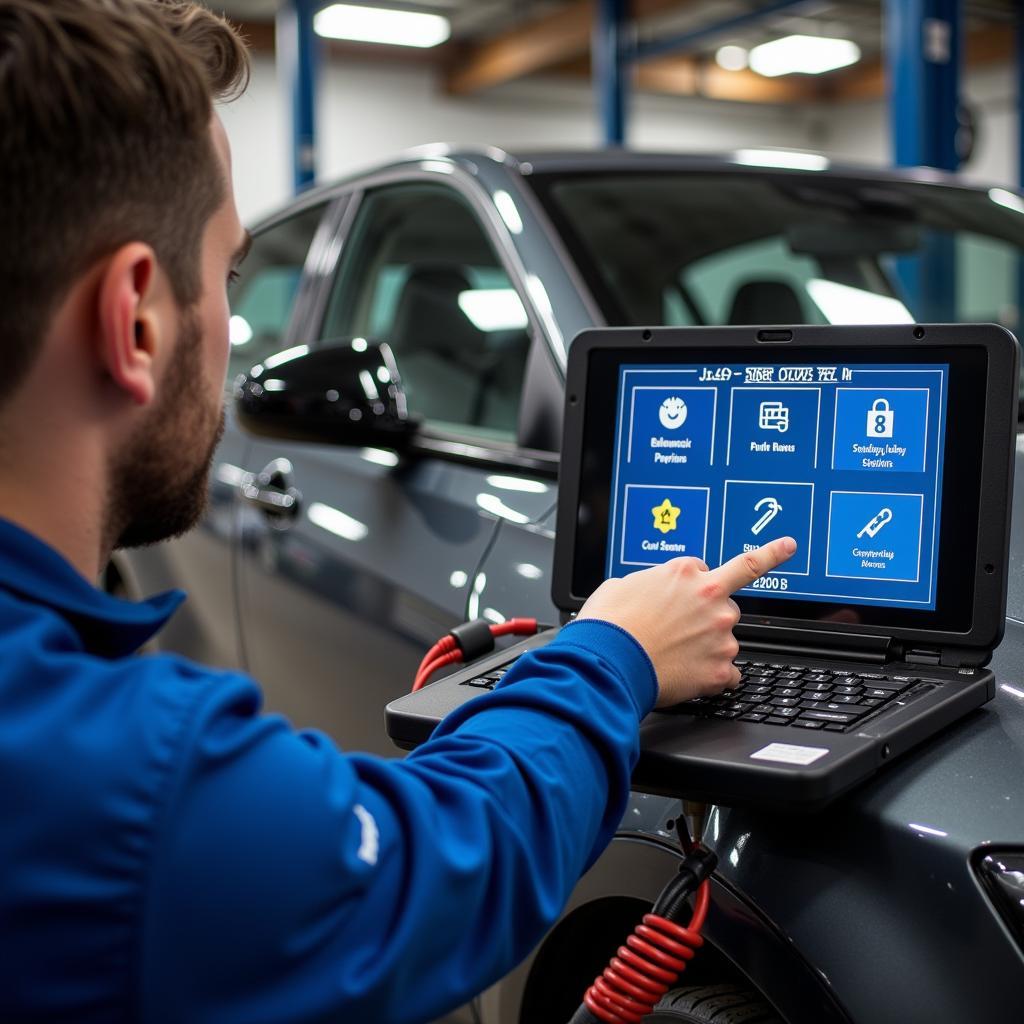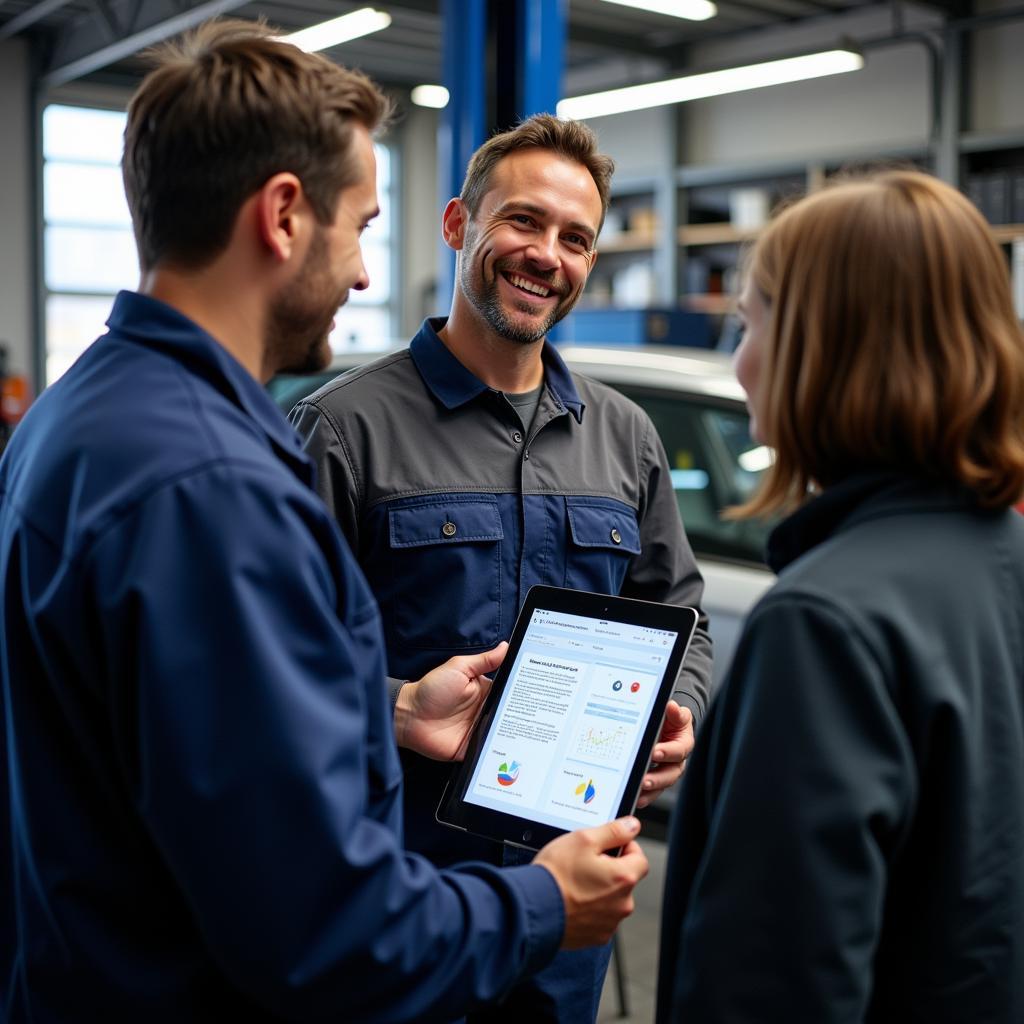Navigating car troubles can be a real headache. Is that check engine light a minor glitch or a major malfunction? That’s where a Diagnostic Car Service comes in. This essential service utilizes advanced technology to pinpoint the root cause of your car problems, saving you time, money, and unnecessary stress.
 Mechanic using diagnostic equipment on a car
Mechanic using diagnostic equipment on a car
What Exactly is a Diagnostic Car Service?
Think of a diagnostic car service as a health check-up for your car. Technicians use a specialized tool called an OBD-II scanner, which plugs into your car’s onboard computer (ECU). This scanner acts as a translator, deciphering complex codes and data from your car’s various systems and presenting them in a readable format.
This information allows mechanics to:
- Identify the issue: The scanner pinpoints the source of the problem, whether it’s engine trouble, transmission issues, electrical faults, or something else.
- Assess the severity: Diagnostic scans reveal the extent of the problem, helping you prioritize repairs and avoid surprises.
- Provide accurate repair estimates: With a clear understanding of the issue, mechanics can give you a more precise estimate for parts and labor costs.
The Benefits of Regular Diagnostic Car Services
While diagnostic services are crucial when your car is acting up, they are also incredibly beneficial as a preventative measure. Here’s why you should consider regular diagnostic checks:
- Early Detection: Catching issues early can prevent minor problems from escalating into major (and expensive) repairs down the road.
- Improved Performance: Identifying and addressing underlying issues can optimize your car’s performance, fuel efficiency, and overall lifespan.
- Increased Safety: Regular scans can detect potential safety hazards, giving you peace of mind on the road.
- Higher Resale Value: A well-maintained vehicle with a documented service history, including diagnostic checks, commands a higher resale value.
 Example of a car diagnostic report on a computer screen
Example of a car diagnostic report on a computer screen
What to Expect During a Diagnostic Car Service
A standard diagnostic car service is a relatively quick and straightforward process:
- Hooking up the Scanner: The technician connects the OBD-II scanner to your car’s diagnostic port, usually located under the dashboard on the driver’s side.
- Retrieving Codes: The scanner retrieves fault codes stored in your car’s computer. These codes correspond to specific issues within various systems.
- Analyzing the Data: The technician analyzes the codes and other data, such as live sensor readings, to understand the nature and severity of the problem.
- Explaining the Findings: The technician explains their findings in clear terms, outlining the necessary repairs and providing an estimated cost.
Choosing the Right Diagnostic Car Service
Not all diagnostic services are created equal. When selecting a service provider, consider these factors:
- Experience and Expertise: Look for a reputable mechanic or shop with experience in diagnosing and repairing your car’s make and model.
- Advanced Equipment: Ensure the service provider uses up-to-date diagnostic equipment and software to provide the most accurate results.
- Transparent Communication: Choose a provider who clearly explains their findings, answers your questions patiently, and provides honest recommendations.
- Fair Pricing: Request a detailed estimate upfront and compare prices from different providers to ensure you’re getting a fair deal.
Diagnostic Car Services: An Investment in Your Peace of Mind
In today’s world of complex car technology, diagnostic car services are no longer optional – they’re essential. Investing in regular diagnostics is an investment in your car’s health, your safety, and your wallet. By proactively addressing potential issues, you can enjoy smoother, safer, and more cost-effective driving experience for years to come.
 Mechanic explaining car diagnostic results to a car owner
Mechanic explaining car diagnostic results to a car owner
Frequently Asked Questions about Diagnostic Car Services
1. How often should I get a diagnostic car service?
It’s generally recommended to have a diagnostic check done at least once a year or every 12,000 miles, even if your car seems to be running fine.
2. Can I perform a diagnostic car service myself?
While DIY OBD-II scanners are available, they may not provide the same depth of information as professional-grade equipment. Additionally, interpreting the results and diagnosing complex issues requires specialized knowledge.
3. Will a diagnostic service void my car’s warranty?
No, having a diagnostic service performed by a qualified mechanic will not void your car’s warranty.
4. How much does a diagnostic car service typically cost?
The cost can vary depending on factors like your location, the service provider, and the complexity of the issue. However, many shops offer free or discounted diagnostic checks with other services.
5. What if the check engine light comes on again after a diagnostic service?
If the check engine light reappears, it’s crucial to take your car back to a trusted mechanic to re-evaluate the situation. The issue may not have been fully resolved, or a new problem could have arisen.
Need Help With Your Car?
Contact us today for all your car diagnostic needs! We offer expert services, cutting-edge technology, and transparent communication to keep your car running smoothly.
WhatsApp: +1(641)206-8880
Email: [email protected]
Our dedicated customer support team is available 24/7 to assist you.

Leave a Reply